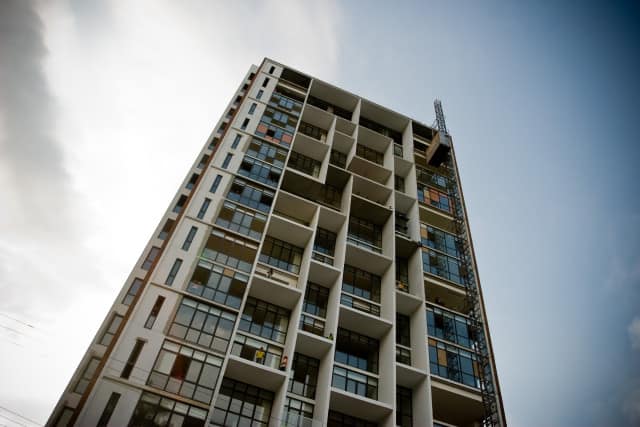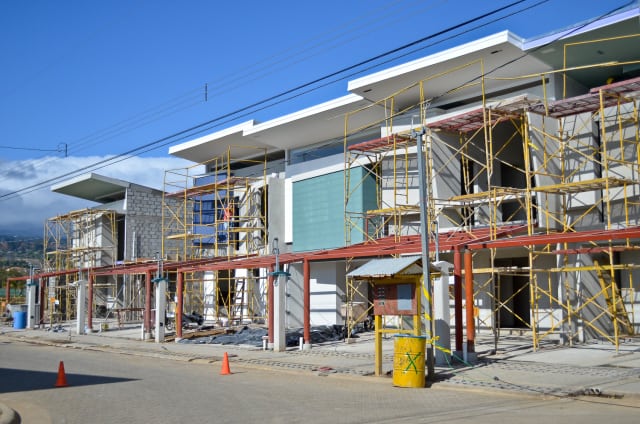Do you plan investing in a future development in Costa Rica? You see all those free magazines with pages and pages of real estate developers advertising houses, condos, offices, and warehouses for sale, and they all look beautiful. But for one reason or another, you are not ready to purchase yet, though you are excited about the possibilities.
This begs the question: What is the normal process?
The Costa Rica construction process is not consumer protective at all and not regulated. If a real estate developer requests any deposits and does not fulfill the delivery of what was agreed on or the whole development goes under for some reason, you might have lost your deposit. Even if you sign an option to purchase/sale agreement with the real estate developer, there is no guarantee that the development will be completed as agreed on.
If you invest in an existing development, you can check if the unit you are buying, as well the common areas, are to your satisfaction and if the bylaws fit your requirements. Should you plan investing in a future development, regardless if it is residential or commercial, the steps to take are different depending on to how much risk you want your investment to be committed to. Escrow is a practically unknown financial tool in the Costa Rica real estate development process, which is the only way to protect the consumer’s interest.
Certain risks and advantages are attached to investing in a future development:
- You will not need most of the purchase capital until closing.
- It will buy you the time you might need to make your move possible.
- You will get a much more attractive purchase price, as prices will go up at least 15 percent before the development is finished.
- A few developers will allow some interior changes to your taste, but most will not.

The normal process of investing in a future development looks as follows:
1. Pick the developments that suit your needs, the location, the size of the unit and the budget.
2. Make a comparison between the developments you picked.
3 Check the background of the developer; examine in person their previous projects and others they have under construction. Whenever you can, talk to the owners of the units in those developments and ask about their experiences during the purchasing process and afterward. This will tell you exactly what you will find under the hood.
4 Ask them for proof that they are registered as real estate developers at the Economy Ministry, or Ministerio de Economia, Industria y Comercio (MEIC).
a) To be able to be authorized to sell their properties, the developer needs to show the specific project, indicating the type of project, location, number of units, unit types and prices (ranges),
facilities (common areas), possible forms of payment, delivery, and others.
b) If the project is developed by a separate company, the documents showing the relationship with the developer already registered must be submitted.
c) The developer must demonstrate financial solvency for the project.
d) The developing project company must be registered with the Tax Administration.
5. Make sure the developer has approved building permits for the project. Getting construction permits for a development can take years in Costa Rica, and the developer might try to move you over to another project and not return your deposit if you don’t.
6. Request a copy of the bylaws to be used in the development you will be buying into. If any change in those bylaws during the construction process might stop you from buying, make sure this will be included as a contingency for you in the option to purchase/sale agreement. Check if the bylaws fit your requirements. For example, if you have pets, are you allowed to keep them? Or to the contrary, if you dislike pets, will you be investing in a future development that doesn’t allow them?
7. Ask which banks have their project pre-approved. Find out what those banks have to offer for those investing in a future development and if you need to be a legal resident or not to apply for financing.
8. Ask for the developer’s payment plan. Usually, the developer charges the buyer two or three percent earnest money, which goes directly into the developer’s bank account. Then the buyer will make deposits during the construction to cover 30 percent of the purchase price. The 70 percent balance will be paid at the delivery of the contracted unit. In the event of bank financing, that payment will be made by the bank. Typically, at that time, much of the infrastructure is still unfinished. The option to purchase/sale agreement should cover the last payment for when the infrastructure is completed.
9. Many developers will not protect the consumer if the project is not delivered on the date promised in the option to purchase/sale agreement, which should be a known fact to you so you can make plans to resolve the issue.
10. Do not commit to making a reservation deposit until you have answered all of your doubts.
11. Request a copy of the purchase/sale agreement and take it to an independent bilingual real estate attorney (one who specializes in real estate) for revision. This is the best pre-investment you will be making for such a large purchase.
12. Sign the option to purchase/sale agreement with the developer, after making the necessary changes to your advantage, and make the necessary deposits.
13. Visit the construction site several times during the construction, always asking for the appointment through the sales office. This shows your interest toward your investment and will eventually pay off because the developer will understand that you will be strict at closing.
14. Before closing, hire a home inspector and deliver the list of items to the sales office. Request another home inspection for final approval if necessary. This is another great investment, as it will save you plenty of trouble during the first months of moving in or renting out the property.
15. Real estate developers generally insist you use their attorney for closing. You have the right of hiring your own attorney for closing in a cash purchase. Why hire someone who won’t be looking out for your interest? Use the same attorney who revised the option to purchase/sale agreement. In case of bank financing, the bank will use their closing attorneys.
On March 18, 2010, a Real Estate Regulating Bill was created by then-President Óscar Arias was presented to the Assembly under the name Ley Reguladora de los Contratos Inmobiliarios y de la Correduría de Bienes Raíces.
When this bill is approved – hopefully one day – it will change the rules in Costa Rica real estate development and make investing in a future development less risky and a more viable option for a secure investment.
–
Ivo Henfling is a Dutch national, a resident of Costa Rica since 1980 and a Costa Rican real estate broker for over 20 years. He is the founder of GoDutch Realty, which covers several locations in the Central Valley, including Escazú, Santa Ana, Atenas, Cariari and Grecia. You can contact Ivo at (506) 2289-5125 / 8834-4515 or at ivo@godutchrealty.com






